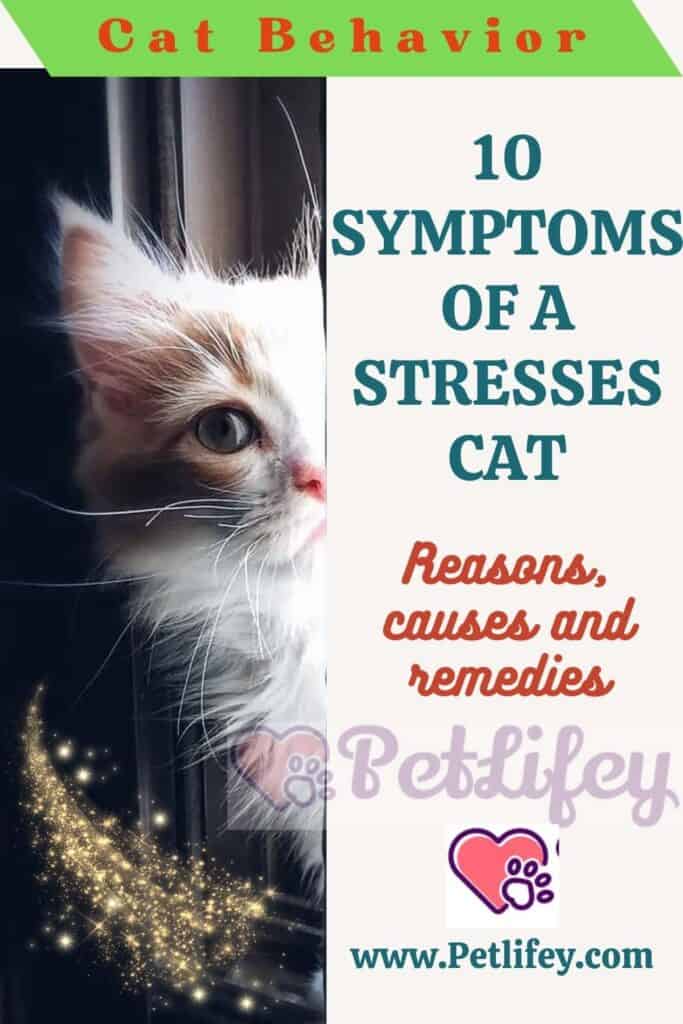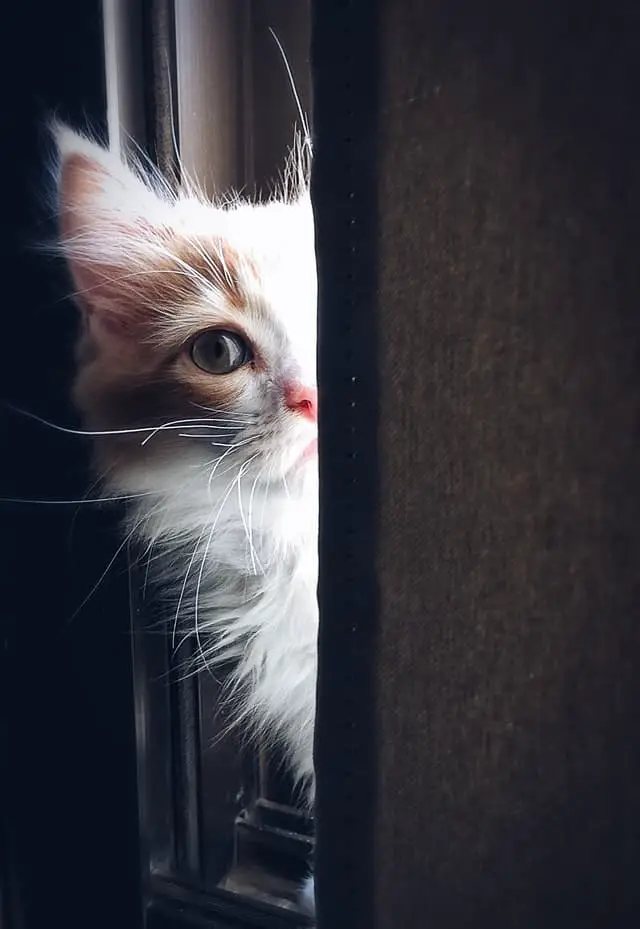
The symptoms of a stressed cat are more common than you think, and you should know how to detect it in your pet, to treat it as soon as possible.
Pets are part of the family, so it is notorious to detect some change in their usual behavior, especially when it comes to cats.
10 Symptoms of a Stressed Cat
As in human beings, the body of cats has a biological reaction that is activated when the animal is faced with threatening or very complicated situations.
In these cases, the animals have to use a greater mental and physical performance, than is usually necessary, causing a hormonal imbalance in their system and organism.
That is why you must know how to identify what are the symptoms that a stressed cat presents, and even that the cat shows signs that it is angry.
Eat little
If your cat is already used to consuming a certain amount of food a day, but you begin to notice that it eats little and leaves a lot of remains on its plate, then you should be alert and take action.
Remember that this situation in the long term, can cause other more serious problems. In addition, excessive consumption of food by a cat is not healthy, nor is any drastic change in eating habit, since all can be symptoms of a cat under stress.
Vomits food
This is usually a noticeable symptom of a digestive problem and although in cats it is usually more common than it seems, you should be careful that this is not a stress alert.
It usually occurs due to poor digestion, or as a result of your pet having consumed an improper object.
It hides and is idle
It is quite common for your cat to seek to hide and thus be able to get a few minutes of solitude, but if this becomes very common and in long hours, then your pet may feel stressed or uncomfortable.
Sudden visits, or persistent and constant noise, are usually the most common causes for this symptom.
Fights with other cats
These animals tend to be very jealous and territorial, in addition, if they are not sociable, they can feel threatened by the presence of other animals.
However, if your cat is sociable and used to other species, but suddenly begins to have constant fights, then this may denote some irritability, common in a stressed cat.
Urine out of the sandbox
For cats, urine can be used as a tool to mark territory, which they tend to do very often and in the wrong places, whenever they feel nervous.
Your cat can urinate in different ways, depending on whether it needs it physiologically or if it wants to mark territory, since, in the latter case, it will only be small amounts of urine, mostly located in different parts of the house that it considers its own.
Licks excessively
Cats are neat animals, and they tend to groom themselves quite frequently, but remember, nothing in excess is good.
If you notice that this behavior becomes excessive and begins to be harmful, such as if your cat begins to lose its hair or form knots, then you should consider that stress is the cause.
They stop meowing
Hoarseness is one of the symptoms that a stressed cat can present, because as we have mentioned, stressful situations or drastic changes can generate physiological discomfort in the animal’s body, including that it stops meowing.
The animal could also present a severe cough or hoarseness, so you should be attentive to these small changes in your feline. Also, the way a cat meows can warn us that something is wrong.
Poor health due to continuous diseases (low immune system due to stress)
It is common for some abnormality in the body to also generate the presence of other diseases in cats, as the immune system has been weakened and the body becomes much more vulnerable, making the animal sick more easily.
This can happen in case your feline remains stressed for a long time.
Repetitive behavior or stereotypes
It happens when your cat makes a movement that is noticed involuntary, and that it becomes repetitive, altering its normal activity or causing physical damage, such as blows.
Bites and scratches frequently
When a cat bites, it is a way in which they usually mark their territory, and doing it on their scratching post is normal and healthy, but if your pet starts scratching everything it sees or bites for no reason, then it can denote stress and nervousness.
10 Causes of Stress in Cats
Since we have mentioned what are the symptoms that a stressed cat usually presents, now you must know the causes and be able to identify why a cat is stressed .
Few toys or items for cats
Many do not know that, like any pet, cats can also get bored, so they need to entertain themselves with special toys for them, and keep them within reach whenever they want to use them, especially when they are left alone at home.
Research what toys your feline needs, see which are its favourites, and be sure to provide them.
Few litter boxes or feeders
This is usually very common when you have several cats, since these felines are very possessive, especially with their belongings, and having to share them with the other animals in the home can be stressful for them.
Bad socialization
The best thing for pets is to teach them to socialize with other species from an early age, but this is often overlooked, so when the animals reach adulthood, they do not know how to relate.
If your feline doesn’t know how to bond properly, then it may get stressed out if a new pet comes into the home.
Handling a cat badly
It is very common for people without experience in animals, to adopt a pet, and although dogs are the favorite “first pet”, many others prefer a cat.
So, it is normal that these people do not know how to handle the animal correctly, treating it more roughly than necessary, and end up stressing it.
Conflict situations with other cats
Fights are not relaxing for anyone, including animals, and conflicts between cats are not only a symptom of stress, but also a common cause.
These fights can occur between household pets, a neighbor cat and even with stray cats that roam the environments.
Inappropriate punishments
There are many who do not know what is the correct way to reprimand a cat, so they end up hurting or stressing the animal.
Physical punishment should not be taken into account to treat animals, or any reprimand that ends up hurting the cat, which, in addition, is unnecessary, since these are intelligent beings, who respond better to other types of actions.
Poor diet or malnutrition
From inadequate food, which can cause some bad indigestion, to the lack of enough nutrients to feed the body, they can end up being causes to stress a cat.
To avoid this, be sure to research the correct diet for a cat, which feed is suitable for consumption and how often.
Pain and fear of something
Fear in cats is usually quite common, especially when they relate the source of their fear to pain, resulting in a stressed cat.
It usually occurs when the animal is faced with unfamiliar situations, which appear to be frightening, or when they have interaction with some foreign object.
Isolation
No human or animal is conditioned to face isolation and loneliness, and although cats appear to be very independent animals, they also need to interact with other beings, so as not to feel lonely or bored.
Changes in routines or home
Unlike other species, cats are animals very attached to their routine and habits, so when their lifestyle is drastically altered, this usually causes them a lot of stress.
Moving is also a very common cause of stress in cats.
People close to the cat, who can attack it
Living with constant fear and the threat that someone in the environment could harm them is reason enough for these animals to be stressed and alert all day.
In addition, this can cause the feline to become aggressive towards others, trying to stay safe.
10 remedies for a stressed cat, what can be done?

The health of our pet is very important, that is why you must know how to calm a stressed cat, either by eliminating the cause of its stress, or by treating the symptoms that it has developed.
In case your cat has symptoms of high stress, it is advisable to go to a veterinarian for a rigorous checkup, because sometimes there may be underlying diseases, which are confused with stress .
- Have enough sandboxes, toys and feeders, for each of your cats have their belongings and their own space.
- Establish a routine for your pet, providing him with food corresponding to certain hours of the day and allowing him to engage in its activities, where it themselves will be establishing its own habit.
- To treat a cat stressed by isolation or boredom, you must lovingly interact with them, allow them to carry out its activities, let them go out to sunbathe and play with them.
- Make sure to provide them with the necessary nutrients in their diet, depending on their size, age or gender.
- Educate them correctly and with the appropriate methods, do not forget that they are very intelligent beings.
- Make sure that any drastic change is generated gradually and calmly, give your pet time to adapt.
- Allow your pet to interact and socialize with other animals, from an early age.
- Give them its space and allow them to isolate themselves when it needs it, but seek professional help for any excessive behaviour it adopts.
- Investigate all the care and the type of handling that your cat needs, make sure that the source of stress does not come from you or your closest environment.
- By understanding its habits and learning how it meows, moves or acts, you can learn a lot about your pet, and be able to identify any discomfort or unusual behavior it may have.
Remember that your opinion counts, so we invite you to comment on this post indicating how much you liked it or it was useful, you can also tell us if you have treated a stressed cat, how was your experience and what method you used to treat it. Remember that you can share this article with whoever you think needs it or whoever finds it useful.






